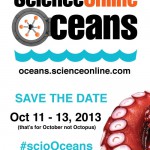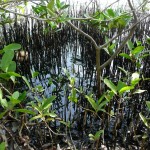Sunday night, cocktail in hand, I prepared myself for an anticipated 3 hours of glorious nature footage. The flash website, the advertisement at the top of this very webpage, and Peter Etnoyer managed to bolster my fervor for Planet Earth. Less than a year ago, at the Deep-Sea Biology Symposium, BBC representatives revealed a few of the excerpts from the series-a shark engulfing a sea lion, ispods swarming a food fall, and birds of paradise in stunning displays of mating ritual. Three hours later, I added this to my ongoing list of anticlimactic experiences. At least the cocktail(s) were respectable. This morning, I hesitated to write something. Have I merely become desensitized to the awe of nature? By having a front row seat to extraordinary deep-sea animals and habitats, have I forever ruined myself on nature programs that inspired me in my youth? Is it time to hang up my stocking hat?
This morning, I caught PZ’s post and realized that I am not the only disappointed person with Planet Earth. Why did the BBC series fail to captivate me? In honesty, this is not a BBC specific problem and transcends all nature programs whether National Geographic, Discovery, or Mutual of Omaha (do they still make these?). The problem is that the series was essentially more of the same. The old formulas were used and unfortunately you already know the formulas.
- To eat and to be eaten…Most nature documentary segments consist of animal A eating animal B. So far the Planet Earth series appears to be 75% predator/prey interactions. Most often these scene plays out with either a canine or feline chasing after an Artiodactyl. Of course its the ‘weakest’ or youngest of the ‘herd’. For “diversity” there is always the obligatory shark feeding frenzy or a hawk eating an innocent chick. What about other behaviors: altruism, reproduction, courtship, communication, cleaning/grooming, nesting, etc.? What I want to see is steamy hot barnacle sex! If we need to stick with the predator/prey relationship I want to see a velvet worm squirting sticky slime from their oral tubes!
- Charismatic megafauna…All nature documentaries appear to employ an equation. If species A possesses a backbone and is larger than a 10 pounds, we must film it. The time on camera for species A is directly proportional to its weight and phylogenetic distance from invertebrates. How many times do I have to see elephants, tigers, sharks, whales, baboons, sea lions, seals, penguins, hyenas, some deer-like creatures, rays, leopards, and bears? 97% of all species are invertebrates and I would venture that 90% of these are far bellow 10lbs. Who is going to speak out for the Sipuncula, champion the Ctenophores, riot for the Rotifera, assemble for the Acanthocephala, and parade for the Phoronids? Enough of the alliteration for now.
- Charismatic places…You can bet money that a nature documentary is going to feature a coral reef, the African savannah, a tropical rainforest, or some pack ice. As other habitats are equally threatened and importance to showcase these to garner support for their preservation. What about temperate old growth forest, chaparral, montane grasslands, mangroves, ponds, tree holes, mosses, decaying logs, mountain streams, marshes, swamps, rocky subtidal, brine lakes, seagrass, vernal pools, and flotsam? When I taught introductory biology, I always have students observe a drop of pond water under a microscope. Many are in awe at the biodiversity in this ubiquitous but neglected habitat.
- The struggle of life…The good old survival of the fittest. The good, the bad, and the dead. Nature is a fickle bitch and something has to die. Is this theme always necessary? In Planet Earth, we are witness to the elephant calf separated from it’s mother in a dust storm. The calf alone follows its mother’s path in the wrong direction, away from water and maternal love. I’m sorry but this just doesn’t register with me, and probably others, anymore. We know the probability that everything dies eventually goes to 100% and that it will not be a tranquil passing. Let’s move on.
- The average human pays attention for only…PZ states it best when he noted that…
It’s a show for people with short attention spans. We got brief vignettes of a few minutes–you’d just be getting into the pumas and alpacas in Patagonia, and zip, we’re off to grizzly bears in the Rockies. It was popcorn biology, crunch crunch crunch, you’ve snarfed down a whole bag a few kernels at a time.
Essentially, ‘themes’ are disjointed at best. Perhaps, the current paradigm of nature documentaries is stream of consciousness. Hey look at this cool thing…hey now look at this cool thing…did you see the cool thing it did? Often what is lacking is any revelations into why or how questions. I don’t buy the reasoning that the audience will not be interested if you provide content. We’ve been trained to think reefs, savannahs, and rainforests are the most magnificent. It is time to reprogram the nature audience automaton.
- The paradox of Lucas…BBC fell headlong into the same pit that Lucas fell into with the newest Star Wars, too much reliance on technology. An equal amount of money and time should be spent on developing the story as technology. Neglect of one will lead to ultimate failure of the whole project. BBC relied some spectacular footage to carry the whole series and it is exceptional. Yet much like my high school girlfriend, the original visual admiration quickly disintegrates to reveal a lack of content. All a nature show needs is a helicopter, a tranquilizer gun, a net, and a film crew. Just like Mutual of Omaha.






I believe Life in the Undergrowth had a segment on velvet worms…
I think that you missed the point of the big difference in Planet Earth, and that’s the filming style. They used high-speed cameras (for the shark attacks) that showed amazing slow-mo shots. They used long-range chopper-mounted cameras for a long sequence of pack hunting behaviour, without edits. They show aerials of herds. They scale piles of bat guano. To me, it was the innovative use of very specialist cameras and photography that showed nature in a new light.
I’m in the UK and have seen the whole series, and I’m not sure how much they’ve shown there yet. Maybe the best is yet to come?
Two points here:
(1) If this is the first episode, it is pretty much a highlights reel for the rest of the series – the other episodes pick one habitat/ecosystem and explore it in more depth.
(2) I strongly suspect you’re getting screwed by them ditching Attenborough. Because I really can’t remember any of these self-indulgent ‘filmed for the first time ever!’ comments people are complaining about in the BBC version – they left that to the 10 minute short films at the end.
That said, they definitely set out for ‘grand and sweeping’ a la Blue Planet, rather than the slightly tighter focus and detail of , say Life in the Undergrowth (for a recent example).
I never said I don’t appreciate the filming style but I suspect most people won’t be that impressed with it. I don’t think its sufficiently different from previous for a common person to recognize. They also made a big deal about aerial photography but I have seen this before in Mutual of Omaha (the intro was always them flying over some herd). In what way is this different?
Mutual of Omaha’s Wild Kingdom? Where narrator Marlin Perkins says “I’ll hold the camera, while Jim wrestles the giraffe to the ground…”
Oh God, not this old formula…
Blogger watches show. Blogger trashes show.
SEEN IT.
(I was amazed by the footage I saw.)
Jim,
Which of the points above do you think is wrong? What did Planet Earth do differently than its predecessors?
i gotta agree with you.
your point number 1 is a big one for me–how many times do you need to see a wolf/ mountain lion chase down their prey?
and also, i agree with the point about the two minute segments getting annoying really quickly.
I’m confused as to whether you’re talking about the first ‘teaser’ episode – which was indeed a series of edited highlights – or the full series itself. I’m pretty jaded about most natural history things on TV these days, but I do not recall coming away from Planet Earth with the same feeling. There is still amazing new stuff to film and they went out and filmed it.
But then.. I don’t work on invertebrates :)
Darren,
You bring up two very good points. I should have been clearer on what parts of the series I saw. 1-3 were aired on Sunday. You also point out, quite correctly, that I research invertebrates so my viewpoint is skewed.
You should also keep in mind that the demographic for this series is not PhD biologists. Most people who do not watch a lot of these programs or know very much about these ecosystems will be amazed, especially kids. My 5th/6th graders who watched this program were awed, and it gave them a much greater appreciation for the natural world. All of them will be watching the remaining episodes. In that regard, this series is a success.
Jaded by nature programs?
I too have seen way too many lions, tigers and bears (oh my!). It gets old and new programs have little to offer and are often more about some crazy wildlife photographer or biologist than about the biology of the animal in question. This definitely did occur with Planet Earth. It was a show dedicated to documenting behaviour and animals that are often overlooked but important none-the-less. While I agree with you that most interactions are way too often overlooked, predator-prey interactions is a major component of the natural world and stimulates interest from the “lay public” towards the natural world. A worthy cause in itself, now more than ever in our “postmodern world”.
Characteristic Megafauna and Places
Yes, all nature programs show charismatic fauna. It is frustrating and denigrates the majority of life’s diversity to “the other 95%” (of which I dedicate my career and life too as well). But even though there was an obvious vertebrate bias in Planet Earth, they brought out animals that are typically not filmed or discussed. For instance, snow leopard are so rare, their footage of maternal instincts and the hunt will add to the body of knowledge that may help conservation. I didn’t know anything about the highland baboons either! The slowed down shark footage was stunning. The whale shark footage gulping down the plankton/small fish bait ball (though i complained about it earlier) was interesting as well and for some reason watching birds swimming under the ocean and gulping down bait fish makes me laugh. Isn’t the deep-sea a charismatic habitat as well? At least in terms of how it is often presented in documentary. And if it all grabs the laymen’s attention…..
Human Attention Spans
I agree with you whole-heartedly here. The filming style was too fast and all over the place. It was hard to digest what was occurring half the time before you are rushed off to another part of the planet and another animal without any warning. They are facilitating an action-packed filming style that is intended to evoke a rush and keep the viewer on edge. This filming style is annoying and I believe promotes ADD and viewers to expect non-stop action instead the calm and tranquility I (personally) associate with nature.
Technology
When Mutual of Omaha was being filmed, helicopters and tranquilizers were technology in wildlife filming! I think technology is good thing but often gets overused. You can’t use it as a substitute in nature filming, but as an aid in understanding nature. I personally loved the slow-mo shark attack scene. I watched it intently and studied every movement and awed at the force the shark must have attacked that seal with to eject himself out of the water like that!
Craig, don’t be so jaded! Planet did a great job in basic, modern-day nature filming compared to what is typically on the Discovery Channel, National Geographic Channel, Animal Planet etc. this is welcome relief. I am hearing about animals other than lions, tigers and bears. And when I am hearing about those animals it is new behaviours I wasn’t aware of, such as bears climbing high in the mountains to feast on moths!
Ouch.
…….
Anyways, I’m DVRing (is that right?) the series and have only watched the first episode, which I had assumed was a highlights or summary of sorts for the series. I was impressed with the footage and the cinematography – especially the great whites leaping out of the water and the birds of paradise (even if they showed those clips a billion times on their commercials). I was annoyed by the “For the first time ever…” comments, but I guess I have to expect Sigourney Weaver to stay within the script for something like this. I was also annoyed at the pulling of the heart strings that these shows always seem to do (panning out as the baby elephant is walking the wrong way, etc) I’m going to hold off judgment of the series until I see a few more episodes – I am hopeful that the others go into more detail, but it sounds like maybe episodes 2 and 3 are no better. That would be disappointing.
The question is can this be accomplished without following the formulas. My contention is that it can and interest even a jaded Ph.d. The deep sea definitely hits the charismatic environment point. But even within this environment the larger organisms from deep corals, vents, and seeps tend to be featured.
I missed the shows – but will catch them on re-run at some point. What I was happy to see in your post was that you are a fellow Hendrick’s Gin fan! Some serious tasty goodness going on there . . .
Perhaps we reminisce about the days when teachers rolled film projectors into the room for screenings of White Wilderness, the Disney epic that threw lemmings off a cliff.
I agree that this past episode of Planet Earth was almost purely eye candy, with no good story to speak of. The production value was excellent, though. It’ll make nice background video for Discovery Channel stores.
I didn’t have a chance to see it since I don’t have cable, but I have noticed a lot of tv science doc are going crazy with the computer animation. I recently watched a Nova where they showed the same computer animation of the Saturn at least 5 times. I would greatly prefered fuzzier telescope images of Saturn to the same artist rendering.
I’ve seen the first episode and I’m about half-way through the second. I agree that this is well-covered territory, but I did enjoy what was already mentioned: the high-speed photography and the stabilized helicopter views. Seeing those pack dogs during the hunt was fascinating. It’s like they got together and planned it before-hand.
Happy to have discovered this blog!
Not being a science person per se, but trying to open my students’ eyes to it, I found it showed the habitats and characteristics of different species in a way we didn’t know before. What I found personally annoying was the narration. Why Sigourney Weaver? Why not someone whose voice was more animated? Maybe a different narrator and/or a different script would help. I am used to watching Animal Planet and other show like that in which the narration is livlier.
Wait a minute… it was narrated by Sigourney Weaver? And there’s me thinking that things are done differently for American audiences!
[the Uk version was, of course, narrated by Sir David]
I think you can purchase the Planet Earth set from amazon with David Attenborough as the narrator. So long as the video cover says it is from the BBC and not Discovery Channel. The ones sold in the Discovery Channel stores will have Sigourney Weaver as the narrator.
I didn’t see this, but my mother mentioned it on the phone last night and she was taken by the show, especially the snow leopard part. She agreed with me that a lot of nature shows move too fast, flitting all over the globe, but she said the cinematography was outstanding.
I watch The Science Channel and National Geographic mostly, but I don’t like the way the advertising is so hyped up -“KILLER PREDATORS!!” or such, to get people’s attention. I grew up with Wild Kingdom, Jaques Cousteau, and I have 6 hours of videotape from when “Shark Week” started on Discovery back around 1990, and it is a bit different now. But there are some programs on NG currently where it’s just ants all hour – I love that.
It seems that in this information-overload age that attention spans have decreased, but I applaud the efforts, at least.
I’m enjoying all the Planet Earth shows on The Science Channel (121 digital cable Houston). Planet Earth: The Future has David Attenborough among other notable conservationists discussing the issues with conservation going forward.
Attenborough talks about the emotional response to penguins vs. frogs and bugs (for example). It’s been looping since last night – I’m overall pleased with these so far.